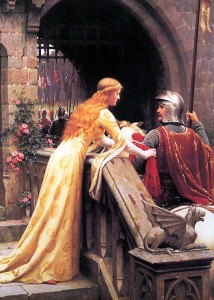
This post is continued from “Courtly Love, Flirtation and the Fall of Anne Boleyn – Part One”.
Courtly Love and the Undoing of Anne Boleyn
Anne Boleyn had learned the rules of courtly love from the “Queen of Courtly Love”, Margaret of Austria, and Anne was known for being strict with her ladies and keeping good control of her household, so where did it all go wrong?
It certainly was not a case similar to that of Lancelot and Guinevere, Anne did not fall in love with a courtier, well, in my opinion anyway!
Greg Walker, in his “Rethinking the Fall of Anne Boleyn”, writes of three factors which made it easy for the courtly love convention to be used against Anne:-
- Mark Smeaton
- Anne’s reckless words to Sir Henry Norris
- Gossip and jokes
Mark Smeaton
It was the confession of Mark Smeaton to adultery with the Queen that prompted Anne’s arrest, the arrests of Norris, Brereton, Weston and Rochford, and their ultimate downfall. Mark Smeaton was a talented court musician who had become part of the Boleyn circle. When Anne spoke of Smeaton during her imprisonment in the Tower, she said “But he was never in my chamber but at Winchester”, when she sent for him to play on the virginals, and then she continued by saying: “For I never spake with him since, but upon Saturday before May Day, and then I found him standing in the round window in my chamber of presence, and I asked why he was so sad, and he answered and said it was no matter.” In response to that, Anne said that she told him “you may not look to have me speak to you as I should do to a noble man, because you be an inferior person”. Mark then replied by saying “No, no, madam, a look sufficed me; and thus fare you well”.
Walker writes of how Smeaton’s odd behaviour to the Queen goes beyond the usual conventions of courtly love and even beyond civil courtesy. Walker suggests that Smeaton’s behaviour could be due to a crush on Anne “or (at worst) a depressive obsession and that Anne’s response to Smeaton does not show a familiarity, which has been argued by G W Bernard, but actually a distance in their relationship, a denial of any relationship between them, rather than an acknowledgment of a relationship. Walker then wonders if Smeaton’s confession to adultery, just 24 hours after this exchange of words, could be down to a desire for revenge for Anne belittling him and dismissing him, or perhaps the “inability to distinguish between fact and fantasy that prompts individuals today to confess to crimes that they did not commit.”
In a previous article, “Mark Smeaton the Scrupulous”, I looked at whether Smeaton may have been a “scrupulous” person, a man who saw sin where there was none, a man who believed that his lust for the Queen meant that he had committed adultery with her even though it was only in his mind, after all, the Bible does say “But I tell you that anyone who looks at a woman lustfully has already committed adultery with her in his heart.” (Matthew 5:28)
Whatever Mark’s reason for confessing – whether it was from revenge, misplaced guilt or the result of torture – I just can’t see that there was any basis to it, Anne Boleyn certainly would not have committed adultery and risked everything for a lowly court musician.
Henry Norris
Some believe that Anne may have committed adultery with Henry Norris or that they were in love and had promised to marry after the King’s death. G W Bernard writes, in “The Fall of Anne Boleyn”, of how Chapuys reported that Norris had actually fathered Elizabeth and that Anne’s words in the Tower, reported by Kingston, are evidence of some kind of relationship between her and Norris: “I can say no more but nay withyowt I shud oppen my body and ther with opynd her gown adding O Norres hast thow accused me , thow ar in the towre with me, and thou and I shall dy together”. Bernard also writes of how Sir Francis Weston said that Norris “came more unto her chamber for her than he did for Mage [Shelton]” and that Kingston reported that Anne teased Norris about how long he was taking to marry, saying: “You loke for ded mens showys, for yf owth came to the king but good you wold loke to have me; and he sayd yf he should have any such thought he wold hys hed war of, and then she sayd she could undo him if she would and ther wyth thay fell yowt both.”
Bernard concludes that such flirtation was damaging to Anne and that it even suggests that Norris and Anne were lovers, but Walker argues that it certainly does not provide any evidence that the two were lovers. We can’t tell from Anne’s words how they were actually spoken – whether she was flirting, teasing or angry – but, as Walker concludes “what is clear is that Anne had gone too far…In moving from the kind of abstracted conventional language that characterised the masquerade of courtly love to the pragmatics of “what if…?” – still more obviously when that “what if…?” involved speaking the unspeakable, “What if the king should die?” – Anne had transgressed the boundaries of both courtly etiquette and political safety. For even “imagining” the death of the king was high treason.”

Anne had forgotten the rules of courtly love, her teasing had got out of control, she had “put her foot in it” and gone too far, hence Norris’s horrified reaction in saying that if he had thought to replace the king then he deserved to lose his head.
Anne then set out to put things right, she went into “damage control” mode and ordered Norris to go to John Skyp, her almoner and chaplain, to take an oath that Anne “was a good woman”. This may well have been a mistake, perhaps she would have been better simply forgetting the reckless words and letting it all blow over, as it may be Norris’s oath that caused suspicion. Did this “row” with Norris or his oath to the almoner lead to a confrontation with her husband, the King? We don’t know, but Alexander Alesius provided Anne and Henry’s daughter, Elizabeth I, with a narrative about an encounter between her parents, Anne Boleyn and Henry VIII on Sunday 30th April:-
“Never shall I forget the sorrow which I felt when I saw the most serene queen, your most religious mother, carrying you, still a little baby, in her arms and entreating the most serene king, your father, in Greenwich Palace, from the open window of which he was looking into the courtyard, when she brought you to him. I did not perfectly understand what had been going on, but the faces and gestures of the speakers plainly showed that the king was angry, although he could conceal his anger wonderfully well. Yet, from the protracted conference of the council (for whom the crowd was waiting until it was quite dark, expecting that they would return to London), it was most obvious to everyone that some deep and difficult question was being discussed.”
Was Anne trying to protest her innocence to a husband who had heard about her altercation with Norris, his trusted friend?
While her words to Norris certainly do not provide evidence for an affair with Norris or a plot to kill the King, Walker writes of how these words, combined with the amorous attention that the Queen was receiving from male courtiers and the fact that Madge Shelton, one of her ladies, was “the subject of sexual interest from more than one quarter”, may well have made an investigator looking into allegations of adultery think that “things in Anne’s household might seem smoky enough to suggest a good deal of fire”.
To me this episode was nothing more than Anne reprimanding or teasing Norris, she just used the wrong words to do it! Imagine if you can being married and having your friend live with you. You’re married and she’s in a relationship with a nice young man and they’ve been going out for a few years, but, although your friend wants to get engaged, the man is just not committing. You notice how he always seems to come around when you are at home, so one day you reprimand him for taking so long to pop the question to your friend and tease him that he fancies you:-
“Or is it me you fancy? I’m taken, you can’t have me!”
But, in saying this to Norris, Anne Boleyn made the fatal mistake of mentioning the death of the King: “You look for dead men’s shoes” or “you’re looking to replace the King”. She didn’t mean anything by it but I can imagine her horror when she realised what she had done, that she had committed treason by mentioning the King’s death. No wonder she quickly set out to out things right, but it was too late!
Gossip and Jokes
Greg Walker writes of how it was “unguarded speech and gossip”, rather than adultery or incest, that condemned Anne Boleyn, quoting the words of Anne’s aunt, Lady Boleyn: “such desire as you have ha[d to such tales] has brought you to this”.
Not only had Anne’s flirtation and teasing got out of control, it also seems that the Queen’s household was a hotbed of gossip and that Anne had joked about the King. Her jokes at the King’s expense were said to have been regarding his sexual inadequacies, his ballads and his dress. Chapuys had reported that Anne had told Jane Boleyn, Lady Rochford, that the King “nestoit habile en cas de soy copuler avec femme et qu’il navoit ne vertu ne puissance” – in other words, the King was incapable of sexual intercourse because he was impotent, he did not have the potency or vigour. Lord Rochford (George Boleyn) had even joked that Elizabeth was not the King’s child and it was this kind of joking and gossip that probably caused George and Anne to be accused of incest – payback!
Walker concludes his article by saying:-
“What are we to make, then, of the queen’s fall? We are left with a lot of smoke but precious little fire, and once the smoke has cleared the battleground seems rather less menacing than it once did…But they [the charges against Anne] were devastating, not because they were true, but because there was sufficient smoke around Anne’s household over the weekend of 29-30 April to give them credibility, credibility that was seemingly cemented by Mark Smeaton’s confession…Anne was convicted, not because of what she had done, but of what she had said: to her brother, as they laughed about the king’s sexual inadequacies and other foibles, to Mark Smeaton, when she snubbed him publicly less than twenty-four hours before he was arrested, and most obviously to Henry Norris when she foolishly joked about the sacrosanct subject of the king’s death.”
Anne’s words, the climate of courtly love in her household, her flaw of speaking without thinking and her love of joking were not the cause of her downfall, but they were used against her and provided convenient ammunition for those who sought to bring down the Queen and the Boleyn faction.
Some of you may think that the whole tradition of courtly love was just trouble waiting to happen, and perhaps it was, but it was a convention of that time, it was the fashion and it was expected for Anne to have that type of “climate” in her household – she was queen afterall and her husband thought he was King Arthur, the master of chivalry. It’s just sad that something innocent and traditional was twisted by Anne’s enemies.
Sources
- “Rethinking the Fall of Anne Boleyn” – An article by Greg Walker
- “The Fall of Anne Boleyn” – A report by G W Bernard, published in 1991 in “The English Historical Review”.
- “The Life and Death of Anne Boleyn” by Eric Ives – click here to see my review of this book.
 News
News
Check out the Red Hood which Kris has just made to match our Anne Boleyn Pembroke Dress! You now have the choice of a crown (such as the Anne Boleyn Pearl Crown in ruby), a tiara (Anne Boleyn Pearl Tiara) or a traditional French Hood. I just wish that Tudor costume would come back into fashion!